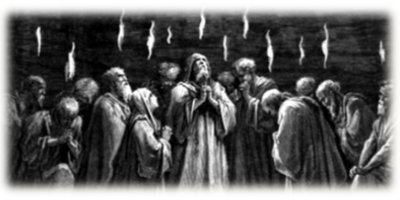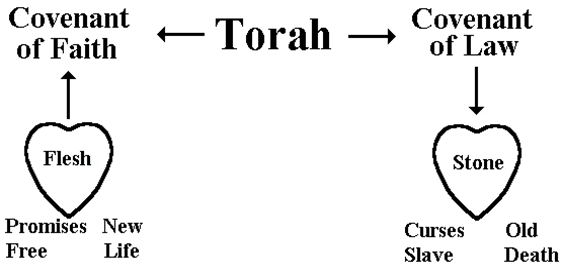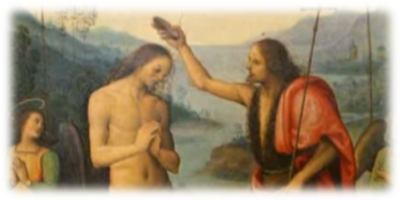The following commentary is based on the teachings of my mentors; Dr. William Bean, Dr. Larry Hirsch and Joseph Frankovitch.
1 And when the day of Pentecost was fully come, they were all with one accord in one place.
Pentecost is the Greek name for Shavu’ot, the Feast of Weeks. In Jewish tradition, God gave Moses the two tablets of the Torah (the Law) on Mt. Sinai, on Shavu’ot, and therefore, in the minds of the Jewish people, this feast is closely equated with the events at Mt. Sinai.
2 And suddenly there came a sound from heaven as of a rushing mighty wind, and it filled all the house where they were sitting.
The “mighty wind” is reminiscent of the “loud trumpets” on Mt. Sinai (Ex 19:16) Most people assume that the “house” is the “upper room,” but it is probably the Temple, the “house” of God as all male Jews are required to go to the temple on Shavu’ot. After all, how could the “multitude” in verse 6 witness these events if they were in an “upper room?”
3 And there appeared unto them cloven tongues like as of fire, and it sat upon each of them.
Just as the top (which in Hebrew is rosh and means “head”) of Mt. Sinai was on fire (Ex 19:18), we see fire on their “heads.” But who are “they?” Is it just the twelve disciples? Nowhere in the account does it say, but Yeshua (Jesus) had many more disciples than just the closest twelve and it is very possible that there was a very large crowd of believers present.
4 And they were all filled with the Holy Ghost, and began to speak with other tongues, as the Spirit gave them utterance.
When God brought the Israelites to Mt. Sinai, it was his intention to fill them with the Holy Spirit right then and there, but the people were afraid and backed off and told Moses that he should speak to God for them (Ex 20:18-19). So God went with an alternate plan. If they could not understand what it meant for God to indwell them individually, then he would dwell with them in the camp, which he did when he had them set up the tabernacle in the center of the camp. But now, in Acts 2, God is bringing back his original plan to indwell them individually.
5 And there were dwelling at Jerusalem Jews, devout men, out of every nation under heaven.
These Jews have all come to Jerusalem for the feast as commanded in the Torah (Ex 23:14–17).
6 Now when this was noised abroad, the multitude came together, and were confounded, because that every man heard them speak in his own language.
When Israel came out of Egypt, they came out with a “multitude” of people from other nations (Exodus 12:38). In Jewish tradition, there were seventy nations, which in Judaism represents “all” nations (from Genesis 10, which lists seventy nations), represented at Mt. Sinai. Another tradition in Judaism is that when God spoke to the people gathered at Mt. Sinai they all heard him in their native languages, which is what is happening again in Acts 2.
Now, let’s just to verse 41 for one more connection back to Mt. Sinai.
41 Then they that gladly received his word were baptized: and the same day there were added unto them about three thousand souls.
In Exodus 32, we read that Moses was taking a long time on Mt. Sinai and the Israelites had lost hope in Moses and they made the golden calf. When Moses came down from the mountain, he was angry and destroyed the golden calf. Moses then instructed the Levites to kill all of those who had sinned against God and, according to verse 28, “about three thousand” were killed.
On Shavu’ot, at Mt. Sinai, in Exodus 32, about 3,000 were killed, but on Shavu’ot, at the Temple, in Acts 2, about 3,000 are saved.
In conclusion, when studying the New Testament, it is imperative that the Jewish culture and traditions of the people of the New Testament period be taken into consideration when attempting to interpret the text.

Like what you’re discovering? Continue the journey from Bible reader to translator.
|







